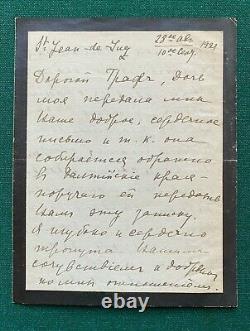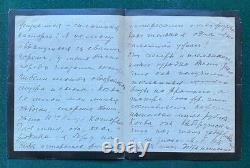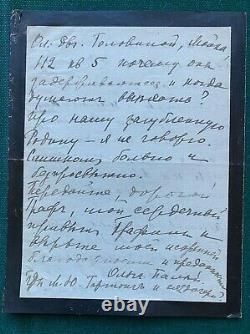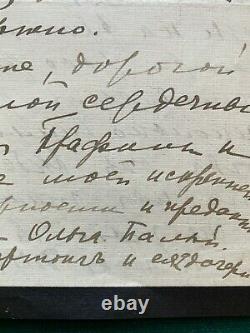Antique Imperial Russian Signed Letter Princess Paley Death Grand Duke Romanov





Bibelotslondon Ltd is a UK registered company based in London Bridge dealing in ephemera and curiosities from Britain and around the world. Our diverse inventory is carefully chosen and constantly evolving. We work very hard to offer the highest quality works at competitive prices. Our inventory is listed online, and we strive to keep our website completely up to date, so our customers can easily check availability.
We believe in offering clients items that are unique and rare for aficionados of the antique and collector's world. Bibelot is a late nineteenth century word derived from the French word bel'beautiful', meaning a small item of beauty, curiosity or interest. The word ephemera is derived from the sixteenth century Greek word ephmera meaning a printed or hand written paper not meant to be retained for a long period of time. Written in Russian from St Jean-de-Luz in France dated OS 28th August NS 10th September 1921 on mourning stationery.
My daughter delivered your kind and heartfelt letter to me. She is planning to leave the Baltic States and so I instructed her to deliver this not to you. My life is nothing but labour! I can't get used to my grief, I always have the nightmare of the death of my husband and my son before my eyes. When my dear girls are with me, their elder children and the children of the second prince, are both like a family to me - I take it over, trying to live through their lives and interests.
As soon as I'm alone - it is a sheer nightmare! I rarely get news from my sister and my niece.
I know they have received visas for France and also 1000 francs which seems to be around several million rubles. I don't know when they will get out of there and what keeps them there.
Maybe you would be so kind to write to Ol. Golovina, Moika 112, apartment 5, and ask why she is late and when she thinks to leave. I'm not talking about our ruined homeland.
It's too painful and hopeless. Dear Count, please, give my best regards to the Countess and trust in my sincere gratitude and devotion. The daughter of Valerian Karnovich and his wife, Olga Vasilyevna Meszaros. She married Erich Gerhard von Pistohlkors.By whom she had four children. Olga and grand Duke Paul met in St.
Petersburg whilst she was married to an officer, by whom she had three children. Grand Duke Paul already was the father of two; his first wife, Princess Alexandra of Greece, had died in childbirth. Olga was granted a divorce from her husband and soon left Russia to marry Paul in Livorna, Italy, on 10 October 1902.
Grand Duke Paul and Olga were still vacationing in Rome when they were forbidden to return to Russia by Paul's nephew, the reigning Tsar Nicholas II. Grand Duke Paul arranged through Prince Regent Luitpold of Bavaria for his wife and their children to be granted the hereditary title of Count/Countess von Hohenfelsen, with a coat of arms. They settled in Paris and bought a house in Boulogne-sur-Seine that previously belonged to Princess Zenaide Ivanovna Youssoupoff. Paul and Olga employed a household staff of sixteen maids, gardeners, cooks, and tutors and were avid art and old porcelain collectors. He was followed later by his wife and their three children.
In May 1914, the family settled in Tsarskoe Selo. In a luxurious palace filled with antiques and objects of art.
Three months after they had settled into their new life, World War I. During the war, the German title of Count/Countess von Hohenfelsen was deemed inappropriate due to anti German sentiment. So in August 1915, Nicholas II created the title of Prince and Princess Paley. At the fall of the Russian monarchy in March 1917, instead of leaving the country, Grand Duke Paul and his wife, not seeing the dangers ahead, decided to stay in their luxurious estate amid the upheaval. As Tsar Nicholas II and his family were sent to internal exile in Siberia.
The family remained in their palace under increasingly deteriorating conditions after the Bolsheviks rise to power in October 1917. By early January 1918, they could no longer afford to heat their large Tsarkoe Selo palace, and they were forced to move to an English dacha at Tsarkoe Selo that belonged to Grand Duke Boris Alexandrovich. Their former home was expropriated and turned into a museum, while Lenin. Himself rode in their car. In March 1918, the revolution tightened its grip. All male members of the Romanov family were ordered to register at Cheka headquarters, and shortly after were sent away into internal Russian exile. Grand Duke Paul, who was too ill to travel, initially escaped but was arrested on 30 July and sent to Spalernaia prison, where he would remain for most of his incarceration. In desperation, Olga left her two youngest daughters, Irina and Natalia, aged 14 and 12, under the care of their English governess, moving with her daughter Marianne von Pistolkers to be closer to her husband's prison.Worried about her daughters, Olga, with the help of a few remaining friends, organised their escape. In early December, they left and took a streetcar to the train station of Ochta.
After a four-hour trip in a cattle wagon, they jumped into the snow and took a horse-drawn sleigh. Finally, they walked for miles in the frigid night air.After thirty-two hours of traveling, they reached. On arriving there, they continued their journey to Vyborg. Grand Duke Paul was killed in January 1919, and tossed into a heap along with the bodies of other victims.
The following month, Princess Olga joined her daughters in Finland. Once in exile, Olga and her daughters moved to Sweden. Where they stayed until the spring of 1920. They eventually settled in exile in France. She died in exile in Paris.
On 2 November 1929, at the age of 63. Size: 14 x 18 cm approx. Photos form part of the description. This item is in the category "Collectables\Autographs\Uncertified Originals\Historical".
The seller is "bibelotslondon" and is located in this country: GB. This item can be shipped worldwide.- Country/Region of Manufacture: Russian Federation
- Type: Historical
- Sub-Type: Royalty
- Signed: Yes
- Object: Signed Letter

